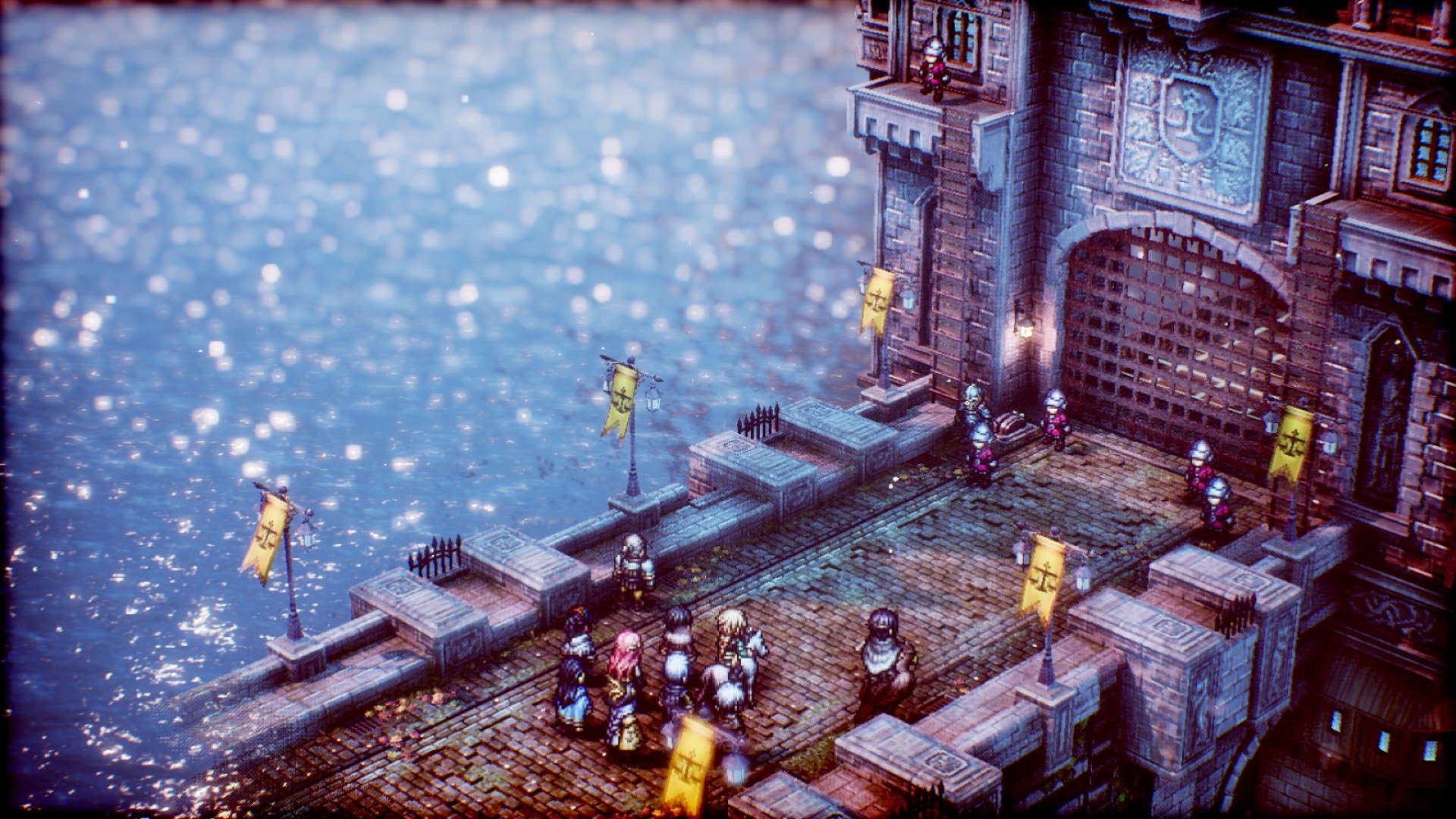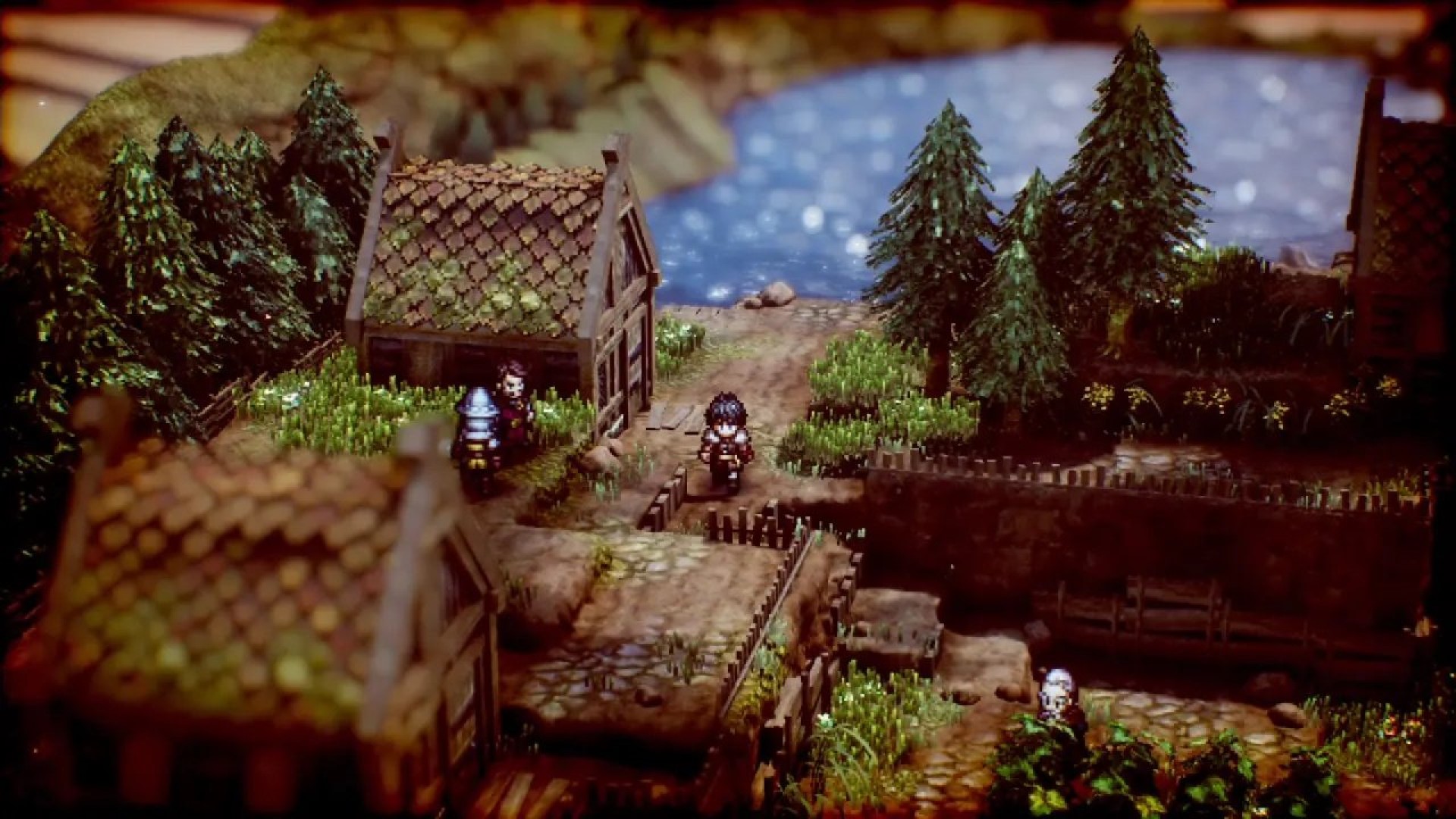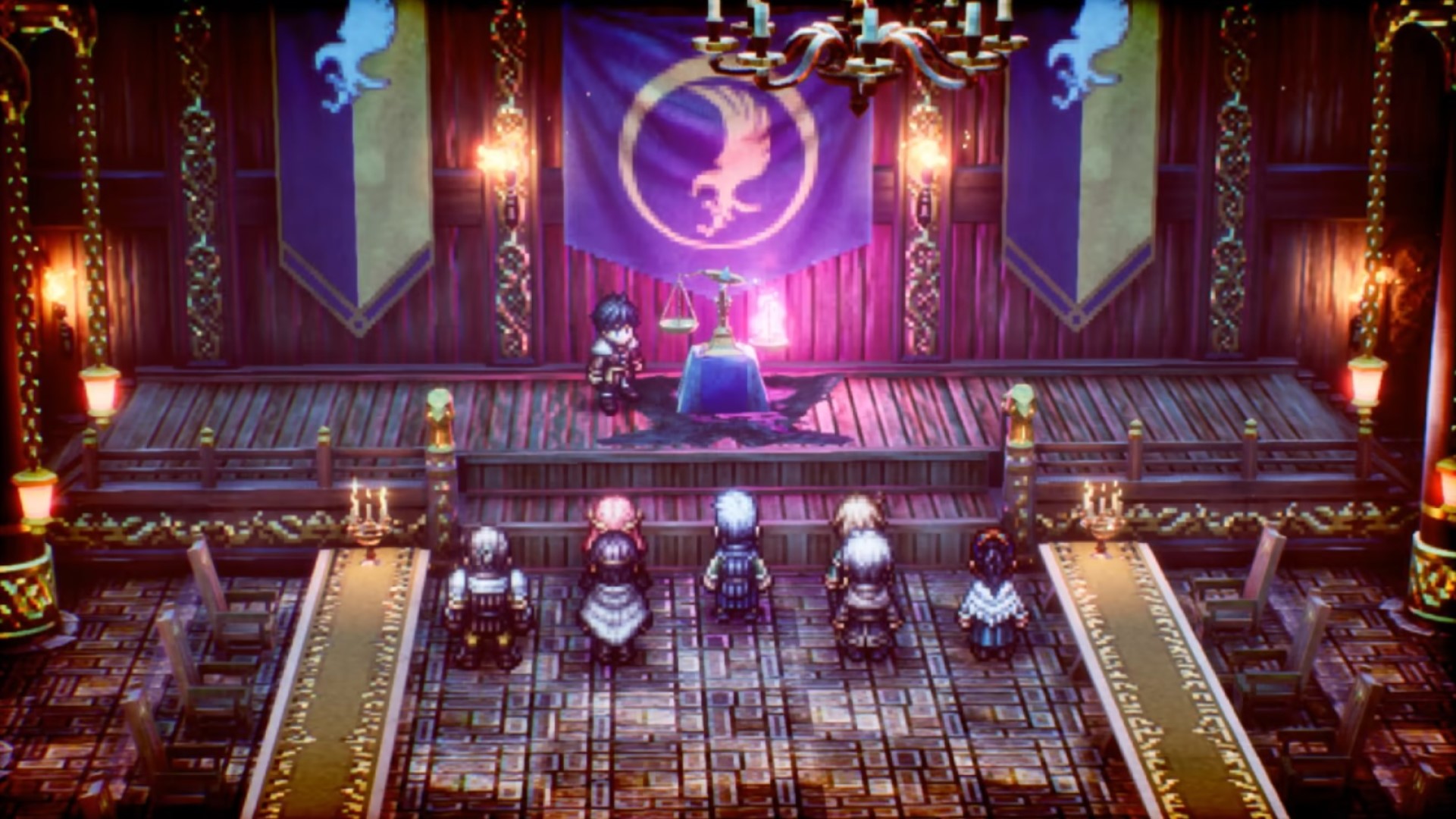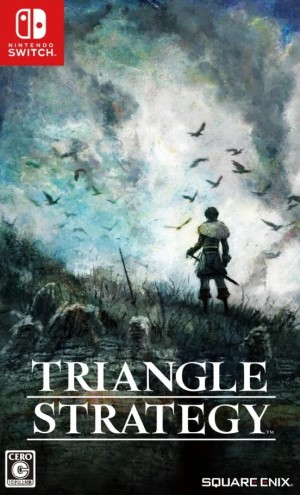
It’s a little hard to say a game is better than expected without sounding condescending. When I say Triangle Strategy is far better than I thought it would be though, I’m not saying I went into it with low expectations. I went in expecting a solid but unspectacular tactics RPG, not a game that would completely consume me and keep me thoroughly engaged for dozens of hours, which it turned out to be. Similarly, while I was expecting to like Triangle Strategy’s turn-based tactics battles as a fan of the genre, I absolutely wasn’t expecting to be just as enraptured with its story, world, and surprisingly divergent choice and consequence mechanics.
Right off the bat, Triangle Strategy surprised me. This is a game that takes its time to establish its world, the different factions within it, the unique cultures and ways of life of each of those factions, their histories of conflicts and alliances with each other. Instantly, Triangle Strategy makes it clear that it cares about its story, its characters, its world. That kind of commitment can easily go wrong if the things that a game is spending time on just aren’t interesting- thankfully, that isn’t the case here.
"Instantly, Triangle Strategy makes it clear that it cares about its story, its characters, its world. That kind of commitment can easily go wrong if the things that a game is spending time on just aren’t interesting- thankfully, that isn’t the case here."
Triangle Strategy is set on the continent of Norzelia, where three ruling powers have sustained a fragile peace with each other since a devastating war three decades ago. There’s a lot that this game reveals about the histories and cultures of these three vastly different kingdoms, from an abundance of cutscenes and conversations to lore drops through logs and notes found in the game’s exploration sections. All of it comes together excellently- regardless of how much you actively choose to invest in learning more about the world of Triangle Strategy, it’s got more than enough to not only attract your attention, but to get you increasingly invested as the story progresses.
Triangle Strategy unfolds like a PG-13 version of Game of Thrones, full of political strife, betrayals, schemes, and large-scale conflicts. There’s a large cast of characters populating this story, many of whom have their own motivations and goals that pull at the larger narrative thread in interesting ways. A lot of the nuances are delivered through side stories, which are optional conversations and cutscenes that you can check out to see glimpses of what’s going on with other key characters scattered throughout the world. Triangle Strategy starts out slow as it builds all of this up and moves all of its pieces into place, but it’s well worth it.
Of course, that’s not to say that this is a storytelling masterpiece- not by any means. While the world-building is impressive, the actual writing is far less so. Exposition can often feel too heavy-handed and dialogue between characters is too unwieldy and clunky. Voice acting, too, is quite terrible- there’s almost no character in the game that sounds even halfway decent, and a good number of varying degrees of importance that sound downright atrocious. Personally, I enjoyed the game’s story and characters significantly more once I turned the VA off.
"Triangle Strategy unfolds like a PG-13 version of Game of Thrones, full of political strife, betrayals, schemes, and large-scale conflicts."
Another area where Triangle Strategy’s story does excel, however, is its choice and consequence mechanics. It was surprising enough back when Square Enix first revealed that the game would even have story choices- not only does Triangle Strategy have choices though, it does them better than most games that attempt it. The choices you make almost always come with immediate and significant stakes, and the game doesn’t shy away from having those choices make an actual impact on the story in a number of different ways, from smaller nuances to vast divergences. More than a few times while playing Triangle Strategy, I’ve had to take a minute to carefully consider each option before deciding what to do next.
It’s not just the choices themselves and the consequences they bring that’s so well executed- the manner in which these choices are made is just as interesting. Rather than being the one character who has the final say in every major decision, your seven core party members vote on how to proceed each time there’s a big decision to make. Helped by how effectively the game establishes clear personalities and motivations for each of these characters, they all feel differently about how to move forward, and it falls to you to convince them with your arguments and sway the majority in favour of whatever it is you want to do next.
There’s multiple factors that affect that, too. For starters, the more you deploy a character in battles with you, the stronger your relationship will be with them, which could make them more open to your suggestions. Meanwhile, it’s not simply a matter of picking from a list of dialogue options either. During exploration sections, many of which come right before voting sections, you can freely explore environments, investigate things, and speak with NPCs. During these exploration sections, on top of being able to find money, consumables, and upgrade resources, you can also find information that can then unlock new dialogue options with different party members, giving you a better chance to sway their vote.
"There’s no shortage of games out there that claim to have branching stories, but more often than not, all they really present is an illusion of choice at best. Triangle Strategy is as far away from being that as it could be, with interesting choices that actually matter and change the game and its story in major ways."
Just as it does with the story, Triangle Strategy goes all-in on its choice and consequence mechanics. There’s no shortage of games out there that claim to have branching stories, but more often than not, all they really present is an illusion of choice at best. Triangle Strategy is as far away from being that as it could be, with interesting choices that actually matter and change the game and its story in major ways. I definitely didn’t expect it, but I’m glad I’ve been proven so thoroughly wrong, because this is one of the best surprises I’ve had in a game in some time.
While Triangle Strategy is unexpectedly good in terms of its narrative, world-building, and choice and consequence mechanics, on the gameplay side of things, it’s solid in all the ways you’d predict it to be. The meat and potatoes here, of course, are the turn-based tactics battle, very much taking a leaf out of Final Fantasy Tactics’ book. Battles are always fun and make use of simple mechanics in interesting ways to encourage players to actually think about things such as positioning, placement, which attacks to use, which items to use, and more.
Terrain, what direction characters are facing, elevation, and more are important factors to keep in consideration as well, while the addition of elemental magic also throws in some interesting twists. Area of effect ice attacks, for instance, can freeze surfaces and make them harder to tread on, fire attacks can leave blocks burning if there was vegetation there, and if characters are standing in water, electric attacks become that much deadlier. Meanwhile, battles are also always kept interesting, because Triangle Strategy does a great job of keeping this fresh with how maps are designed, or what objectives you have to accomplish.
"Battles are always kept interesting, because Triangle Strategy does a great job of keeping this fresh with how maps are designed, or what objectives you have to accomplish."
The sheer variety and range of choices available in which characters you can deploy for battles is also a crucial cog in the machine. Triangle Strategy doesn’t have a Job system or a very robust class system, but while it keeps things limited on that front, it makes up in other ways. Specifically, the cast of playable characters that you recruit over the course of the game is absolutely huge, and each character feels distinct from all the others, with their own unique abilities, strengths, and weaknesses. One might be a slow-moving tank, one might be an assassin that can attack twice in a single turn, another might be a hawk-rider that can move farther and ignore terrain constraints while attacking from range, while one might be a mage specializing in fire or ice magic. There’s impressive variety on offer, and there’s almost more than enough flexibility to allow you to compose your core party around the characters that best suit your play style and strategies.
Outside of battles, Triangle Strategies keeps you busy in plenty of other ways. There are plenty of exploration sections in the game, where you’re put into small, instance, diorama-like environments and allowed to freely move around. Environments are generally pretty small and often reused, but NPCs generally always have something new to say, and with new information to learn that can help out with future choices and new items and more money to find, you’re always encouraged to explore. In addition to exploration, battles are also always broken up by new side stories popping up, so collectively, the game has enough interesting activities in rotation to keep from feeling monotonous or repetitive.
Anytime you’re not in a battle, you can also visit your encampment, which is a hub location of sorts where you can talk to various party members, make purchases from vendors, participate in mock mental battles, and power up your party. The repeatable mock battles are a great way to grind out levels, currency, and rewards, but the primary purpose of the encampment is to facilitate the game’s progression mechanics- which, honestly, are a little restrictive and straightforward.
"Outside of battles, Triangle Strategies keeps you busy in plenty of other ways."
Characters gain XP and level up automatically based on how they perform in battles, but using your money and the upgrade materials you’ve gathered, you can also head to your encampment to upgrade specific stats, which vary from character to character. Meanwhile, characters can also upgrade their classes multiple times upon reaching specific level requirements and using medals, which are rare resources that are rewarded at some points in the story. Medals can also be purchased from a special vendor in the encampment (who also eventually becomes a party member) in exchange for kudos, which are earned in battles by performing special actions, such as a backstabs, follow-up attacks, making use of higher ground, dealing collision damage to enemies, and more.
For the most part, however, the options available to you for all of these upgrades feel rather limited, and more often than not, far too incremental. They do cumulatively make a difference, but each individual upgrade feels too incremental, which is exacerbated by the slow pace progression generally moves at in the game. Meanwhile, the economy, too feels a little unbalanced, especially when it comes to spending kudos, because to me, the vast majority of items that were generally available for purchase just didn’t seem worth it to me.
Where visuals are concerned, Triangle Strategy is a bit of a letdown, though not entirely so. It uses the HD-2D pixel art style that was pioneered by Octopath Traveler, but though it always looks pretty, it lacks the sharpness, clarity, and detail of the 2018 game its visuals are inspired by. Where every inch of Octopath Traveler looked gorgeous and stunningly crisp, Triangle Strategy can often look a little muddy and lacking in detail.
"Triangle Strategy is easily one of the best tactics RPGs I’ve played in recent memory."
Taken as a whole though, Triangle Strategy is an absolute triumph, to a greater degree than I could have ever expected, and in more ways than I could have ever expected. Not only is it a solid tactics RPG that should appeal to any and all genre fans, especially those that still look back fondly on Final Fantasy Tactics, it’s also got an engaging, ambitious, and layered story to tell, backed up by incredible world-building and interesting choices with actual weight and consequences. For all of these reasons and more, Triangle Strategy is easily one of the best tactics RPGs I’ve played in recent memory.
This game was reviewed on the Nintendo Switch.
A layered, complex, ambitious, and captivating story; Incredible world-building that enriches the story; Vast cast of well-defined personalities; Interesting narrative choices with actual stakes and consequences; Unique implementation of choice and consequence mechanics with a voting system; Mechanically solid battles that will always keep you engaged; Plenty of variety in map design and objectives; Exploration segments, side stories, and the encampment do a good job of breaking up the pace; Impressive variety of deployable characters with unique abilities, strengths, and weaknesses.
Awful voice acting; Clumsy exposition and dialogue; Restrictive progression; Unbalanced economy, Doesn't look as good as Octopath Travaler.























